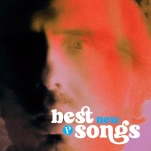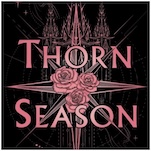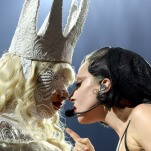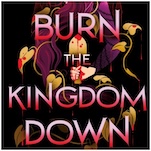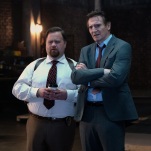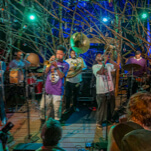Gregory Porter: “Let Me Mess with Perfection”
Photo by Erik Umphery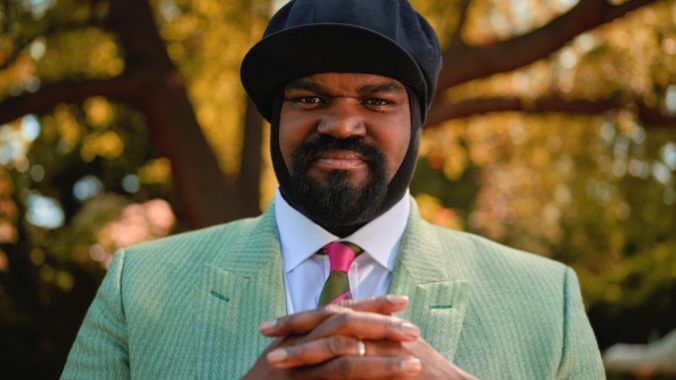
“I’m reluctant to do things in a conventional way,” confesses singer Gregory Porter; “that may be why I gravitated to jazz in the first place.”
Porter is able to sell out performing-arts centers on the strength of his rich baritone, his storytelling lyrics and his updating of the ’70s gospel-soul tradition. But he describes himself as a jazz vocalist—and rightly so, for the unpredictability of his songwriting and his live performances prevent listeners from ever taking for granted what might come next.
“Sometime when I’m writing,” he continues, “there will be an obvious rhyme, a perfect rhyme, but I’ll tell myself, ‘Let me mess with perfection.’ Sometimes when I’m performing, when the audience is expecting the melody line to resolve to a certain note, but I’ll choose a different note.” He demonstrates over the phone from a Manhattan hotel room by singing a line that ends on the one chord, then singing it again so it ends on the five. “I may have a perfect groove, but I’ll mess with that too, letting my voice land on different beats.
“I do it to make the audience feel an angst in their bodies. I do it to make myself feel that same angst. It puts a fingerprint on the music that says, ‘Okay, this is who I am.’ I like that. It’s okay to be one perfect flavor of vanilla, but if you mess with that, you come across as just yourself—and the music comes across more as art.”
Porter is even willing to mess with something as seemingly predictable as a Christmas album. For his new release, Christmas Wish, he wrote three new songs for the record and chose several others that dig into the eternal dilemma: How do you enjoy this happiest of holidays when you know there are so many people hungry and hurting in the world? How do you balance the awareness of that truth with the much needed joy and optimism of the day?
“It could have been just a side project,” he admits, “but I decided to use it as a continuation of my work. If I’m going to be writing about Christmas, the songs will be in my voice, songs that speak about charity as well as nostalgia. When I sat down to write, the first words that came up were ‘I wish that I was blind.’ I thought, ‘Is that okay to say? Am I being politically incorrect?’ But the next lines made it okay.”
Again he started singing over the phone. “Strange thing to wish for, but I just can’t unsee all this misery.” Switching back to his speaking voice, he concluded, “I think I can be forgiven for not wanting to see, to not hear the things that are happening in the world, because it can be painful. But I know I have to look, have to hear. The hope comes through, though, in the lines,” and he starts singing, “Everything is not lost, ‘cause Christmas and New Year is coming on strong.”
That song is called “Everything’s Not Lost,” and it’s followed by a remake of Stevie Wonder’s 1966 single, “Someday at Christmas,” which attempts a similar balancing act with couplets like, “Someday at Christmas, we’ll see a land with no hungry children, no empty hand.”
“With Stevie’s song,” Porter says, “you don’t remember all the lyrics, because there’s a lot of them, but you remember the message: Someday we’ll do right by the poor and hungry, and someday we’ll have no more war. We put so much puffery and cotton candy around this time of year, but maybe we should be thinking about how we can help other people. Maybe that’s what the holiday season should be about.”
The album’s title track describes a sumptuous Christmas dinner that Porter’s mother once prepared for the family. On the table were “turkey, greens, cornbread and candied yams,” but just when the listener is ready to vicariously sample the dishes, the songwriter pulls the rug out from under us again. Porter’s mother tells the family to box up the food—and the nicest clothes in their closets—so they can give it all away to the homeless and the poorest in the neighborhood.
“Only after we’d fed them,” Porter remembers, “did we bring the leftovers home and eat those. To the people listening to that song, I’m saying, ‘That’s what you do on Christmas Day. Just when that turkey is a glowing a perfect brown, that’s when you give it away to someone who’s hungry.’ I’m trying to say it can feel good to share some comfort, equality and optimism.
-

-

-

-

-

-

-

-

-

-

-

-

-

-

-

-

-

-

-

-

-

-

-

-

-

-

-

-

-

-

-

-

-

-

-

-

-

-

-

-
















